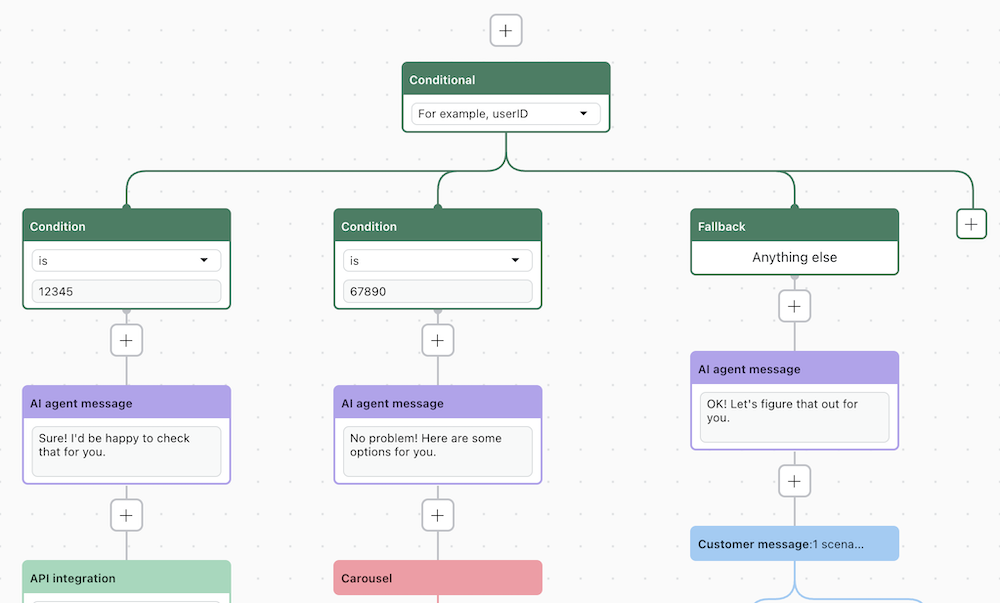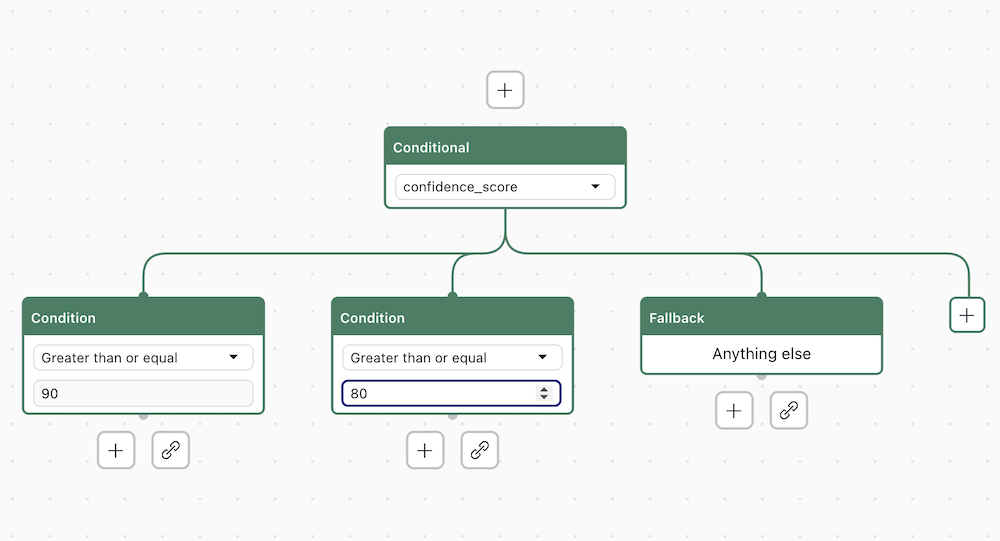In AI agents - Advanced, parameters are pieces of information you can collect and use to tailor your AI agent workflows. Specifically, you can leverage parameters in conditional blocks, segments, and API integrations.
This article contains the following topics:
Available parameters
Parameters can come from three sources:
CRM platform parameters
CRM platforms typically store customer information such as name and email address. This information can be fetched from your CRM platform and saved to use in conditional blocks.
To fetch information from your CRM platform, add an action associated with the “Conversation started” event to collect the data from your CRM when a conversation begins. The information will be collected for every new conversation and applied to all dialogues within your AI agent.
Session data parameters
Session data refers to information customers provide during a messaging session with the AI agent. Add a block-level action to a dialogue flow to fetch session data and save it as a parameter value.
These session parameters are collected by default:
| Parameter | Use case example |
|---|---|
| {{lastDetectedLanguage}} | Provide the unsupported language system reply in the user’s language. |
| {{active_language}} | Create language-specific replies.
You must use the language’s ID, not its name, as the parameter value. You can find the ID by going to Settings > AI agent settings > Languages and selecting a language. |
| {{chatTranscript}} | Attach the conversation transcript to a ticket for escalation via email. |
| {{lastVisitorMessage}} | Repeat the customer’s words, often in a default reply, such as: “I’m afraid I don’t know anything about {{lastVisitorMessage}} yet.” |
| {{integrationId}} | Route incoming messages to relevant AI agents with
routing rules based on the source
(integrationId) of the incoming
message.
|
| {{confidence_score}} | Base the reply on the intent recognition confidence
threshold. Confidence_score is rounded up
or down to whole numbers (integers).
|
| {{lastResolution}} | Set a different dialogue flow based on the last custom
resolution state: Undefined,
Informed, Resolved,
Not Resolved, Escalated To
Agent, or Escalated via Email,
and send to your CRM as a tag upon escalation. |
When creating your own session parameters with an action, don’t use the same name as one of these system parameters. It will cause an error and the data won't be retrieved.
Entities are also considered session data parameters. The name of the entity is the name of the parameter. Any information captured via entities is stored as session data until two hours after conversation inactivity.
Backend integration parameters
The AI agent can also fetch information from a custom API integration to create personalized dialogue flows.
Available operators
- String: Word
- Boolean: True or false
- Array/list: Comma-separated list
- Integer: Whole number
- Float: Decimal number
| Operator | Use for | Example | Expected parameter type | Condition value type |
|---|---|---|---|---|
is / Is not |
Single values |
country
is
Germany
|
string | string |
Is (boolean) |
True or false statements |
loggedIn
Is
True
|
boolean | boolean |
Is (number) |
Single values | timeout is 30 |
integer | integer |
Is in / Is not in |
An OR condition with multiple values separated by a comma |
country
In
Germany, Japan, Finland
|
string | array |
Array includes item / Array does not include
item
|
Checking for a particular value within a list of values stored as an array in the session |
tags_Array
Array
Includes item
VIP
|
array | string |
Text includes / Text does not
include |
Checking for a substring, like a country code in a URL, based on text-based data in the session |
URL text
Includes
fr
|
string | string |
Is present / Is not present |
Checking if a parameter is present in the session, without a specific value |
email
Exists
|
any | N/A |
Starts with / Does not start with |
Single string values |
country
Starts with
united
|
string | string |
Greater than
Greater than or equal
Less than
Less than or equal
|
All number types (integers and floats), with content
recognition and actions, including whether the value
|
Number
Greater than or equal
9
|
integer or float | integer or float |

